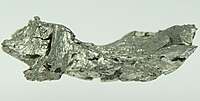
Photo from wikipedia
Gadolinium-based contrast agents (GBCAs) are commonly used for enhancement in MR imaging and have long been considered safe when administered at recommended doses. However, since the report that nephrogenic systemic… Click to show full abstract
Gadolinium-based contrast agents (GBCAs) are commonly used for enhancement in MR imaging and have long been considered safe when administered at recommended doses. However, since the report that nephrogenic systemic fibrosis is linked to the use of GBCAs in subjects with severe renal diseases, accumulating evidence has suggested that GBCAs are not cleared entirely from our bodies; some GBCAs are deposited in our tissues, including the brain. GBCA deposition in the brain is mostly linked to the specific chelate structure of the GBCA: linear GBCAs were responsible for brain deposition in almost all reported studies. This review aimed to summarize the current knowledge about GBCA brain deposition and discuss its clinical implications.
Journal Title: Korean Journal of Radiology
Year Published: 2019
Link to full text (if available)
Share on Social Media: Sign Up to like & get
recommendations!